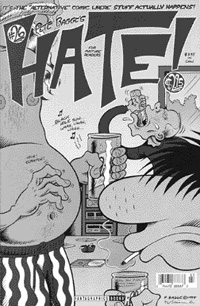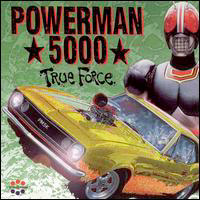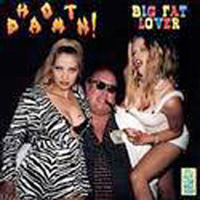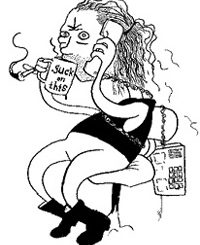 Peter Bagge
Peter Bagge
An interview with Peter Bagge
by Jef Taylor
Is it true that Hate is soon going to end?
Um, not soon, but if all goes according to plan (there’s a lot of “ifs” here) I may end it with number 30, which if I remain on schedule, would be this time next year, so, yeah, I guess that is pretty soon! (Laughs)
But there’s a lot of “ifs.” I may change my mind and keep it going, but that’s pretty much been my plan for a long time. I very much want to avoid being economically tied to Buddy Bradley for the rest of my life, you know what I mean?
What, then, is next?
It’s real hard to say. I have lots of different ideas. I’m just gonna see which one bubbles to the surface, but I wouldn’t mind starting a new magazine. Like, one of the “ifs” is if we can build on the amount of advertising revenue that we’re getting for Hate, because that’s something new, not just to me, but to my publisher, Fantagraphics… The next issue, which will be out at the end of this week, has an expanded page count and has more ads in it, and we’re just gonna keep trying to build on that, and expanding the page count, starting to run work by other artists, and I’m doing collaborations with other artists in the extra pages.
Will it become more of an anthology thing or will it still be mostly your material?
I’m gonna slowly turn it into Weirdo, only with advertising. And, yeah, I’ll have a story in it, still like Hate up to 30 and if it goes beyond, it’ll still at least have, like, a feature Buddy Bradley story in it.
So people can follow the characters.
Yeah, but just to keep the ball rolling, even if I change the title of the magazine, or stop doing these Buddy Bradley stories, if we have a considerable amount of advertising revenue going, I’d like to keep that going. The idea is to switch it into a more general magazine, maybe expand the page count even further.
Will you include text, like you did with I Like Comics?
Yes. It wouldn’t be quite that text heavy, but, in fact, in the very next issue of Hate I’m starting some regular columns by some favorite writers of mine. Lisa Carver is gonna have a regular column in there, an illustrated column, and I’d like to keep that going if she’s up for it. Some other folks I know from the “fanzine” world I’ve also given some columns to work with. So, yeah, we’ll see how it goes: make it more of a general magazine, but the emphasis will always be on comics. One thing we’re finding out already is that certain advertisers, folks that you could really milk for dough, like liquor and cigarette advertisers (laughs), they won’t touch Hate, even though it’s read by adults and it’s just for adults, it’s still a comic book.
Have you approached the Sea Monkeys people?
No, I haven’t. I tried to contact a lot of those old advertisers that sold novelty items and they must be out of business, they never responded. There’re some new outfits that do similar stuff, they sell novelties. It’s the flipside with them of the liquor and cigarette advertisers’ complaints. “Well, even though your particular comic book isn’t for kids, we can see it now: some anti-liquor/anti-cigarette lobby jumping on this and distorting it in the media’s eye, saying `Look at this! They’re running liquor ads, cigarette ads in a COMIC BOOK!’ and that’s all the media needs to hear. There would be a feeding frenzy. And the content of the comic book just won’t matter or factor in. By the time it filters to the top, nobody’s gonna care anymore.” They just feel like “Look, we’d be opening ourselves wide up. We’re already getting beat up. We’d literally be handing people a tool to beat us up with.” With novelty companies and toy companies we have the opposite problem. Traditionally, they did advertise in comic books. They say “Oh, well, this comic book, it’s not really for kids. We try to keep a squeaky clean family image with our company and if our ads appear in your comic book, people will flip.” We’re kinda between a rock and a hard place.
Do you think there will be a time when the perception of comics as a kid’s medium will totally fall away, and everyone will know that there are kid’s comics and there are comics that are not for kids, the same way there are TV programs for kids and TV programs that aren’t for kids?
I don’t know. I’ve been in this business all of my adult life and that perception has changed very little. There’s just a gut reaction, an automatic association that the average human being makes, and it’s ingrained. And while it’s in the interest of even mainstream publishers to try to broaden the reading audience of comics, and try to market comics for everybody and not just for kids… whenever they try to do that, it tends not to pan out. It might be a flash in the pan, like when something like MAUS comes out. Or something pathetic and tragic that happens when Marvel or DC try to say “Look, comics aren’t for kids anymore,” they’re putting out more adult superheroes. To me that’s exactly the same as saying “Barbie isn’t for kids anymore.” It’s a doll! Of course it’s for kids! Assume they put out a comic like that. Well, you’re just fucking with this kid’s medium! They do themselves in.
Will anything remove the stigma of being a comic book reader?
(sighs) That in itself isn’t so important. There’s also a stigma attached to being a television watcher, you know? At least comic book readers are reading something. I would just say it all depends on what you’re reading. If you’re sitting on a bus reading MAUS nobody’s gonna point and say “look at that dumb-ass” just because it’s in the comic book format.
Your comics use the inherent good that comics have: they’re fun, and accessible. And yet, they don’t talk down to the reader.
Well, that’s most certainly what I’m striving for. There’ve been problems when I’ve changed the format of Hate. When I took an inker, and was in color and took ads, all of these things are associated with mainstream comics, and people in the alternative comics community thought it was a mainstream comic. They wouldn’t even read it, which I found really alarming because the subject matter is much deeper. It’s far more personal and painful, now than anything I did when Hate was in black and white. That was part of the reason I felt compelled to add the color, and make it look a bit more palatable. If I was dealing with this subject matter and drew in a more realistic style, or a less cartoony style and it wasn’t in color, it’d be really hard to take. It’s really painful stuff, so I’m alarmed when I hear peers of mine saying, “Oh, P. Bagge sold out, that’s a mainstream piece of crap.” It’s really obvious to me that they’re not reading it or they can’t get past these surface things.
Or there’s jealousy at work.
I really hope that’s not the case! That would be even more pathetic because the changes I made, I made because I wanted to. I like to think, if they have a choice, if they’re working in black and white they’re doing it because they want to, they prefer it. I know certain artists, like Robert Crumb, he really prefers his work in black and white. And I’d like to think when they’re complaining to me about the color that they prefer black and white, and it’s not just simply because “Well, gee, I don’t have a choice. I’ll never admit that if I had a choice, if the economics made it possible, that I would do what Peter Bagge did and switch to color.” If that was the truth they would say so.



